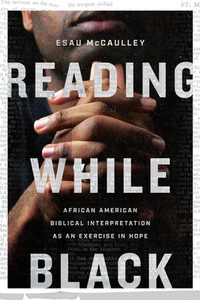Take a photo of a barcode or cover
236 reviews for:
Reading While Black: African American Biblical Interpretation as an Exercise in Hope
Esau McCaulley
236 reviews for:
Reading While Black: African American Biblical Interpretation as an Exercise in Hope
Esau McCaulley
Thoughtful read, important for all Christians to think critically about how we approach scripture as to not read our personal experience into the text but rather really contemplate what was happening in their context and place. I don’t know that I totally agree with all his conclusions but overall a very thorough text on the hope to be found in scripture for all Christians, but especially those who are black. And potentially a solution to a better way forward than what we currently see happening in America.
challenging
hopeful
informative
inspiring
reflective
sad
medium-paced
This has been one of my favorite reads since 2020. In a year of so much upheaval and racial tension, this served as a balm to those who have wrongfully had the Bible weaponized against them and their desire to see racism end and justice prevail. This book served to give me hope in a journey that is still not complete. I’m thankful for Esau McCaulley and his insights! This is a book that I plan to revisit many times over the years.
What a gift this book is, this year or any year. If Scripture isn't the source of hope and justice for the marginalized and oppressed, then it can't provide that hope to anyone. McCauley digs into the theological resources of the black church tradition to recover an appreciation of the depth and breadth of God's Word that every Christian needs to hear.
challenging
informative
inspiring
reflective
medium-paced
I found what he has labeled as the “black ecclesial interpretation” a helpful hermeneutic to balance out the overly “objective” interpretations of the modern evangelical church. His interpretation creates space for a individual experience and how that will inevitably affect the way that we read. Not only does it allow this kind of subjectivity but it celebrates it. Different experiences create different lenses to read the Bible through that will allow us to see new, orthodox readings that would have been missed otherwise.
The reason this is a three star and not five star book is how little he actually delved into the implications of this reading. His writing in this work is sadly very surface level at all the places I felt myself yearning for a deeper understanding. My reading may have been partially skewed by the fact that I listened to this book instead of read it.
I would recommend reading this book simply because I find his hermeneutic unbelievably important for living in the postmodern world.
The reason this is a three star and not five star book is how little he actually delved into the implications of this reading. His writing in this work is sadly very surface level at all the places I felt myself yearning for a deeper understanding. My reading may have been partially skewed by the fact that I listened to this book instead of read it.
I would recommend reading this book simply because I find his hermeneutic unbelievably important for living in the postmodern world.
challenging
emotional
informative
inspiring
reflective
sad
medium-paced
Dr. Esau McCaulley, New Testament scholar and outspoken OutKast fan, has provided Christians a much-needed and easily accessible work, "Reading While Black: African American Biblical Interpretation as an Exercise in Hope." I read this book quickly; it is difficult to put down. McCaulley is a captivating writer as well as a thought-provoking interpreter of the Scriptures.
The book centers on what McCaulley terms the "Black ecclesial interpretation" of the Bible. This tradition differentiates itself from the mainline tradition (or even the Black progressive tradition) which would see the Bible as worsening the problem of racism; such ideas result in the abandonment (at least in part, if not entirely) of the Scriptures as useful and divinely inspired. On the other hand, the Black ecclesial tradition differentiates itself from conservative and evangelical hermeneutical traditions in that it takes the plight of Black and Brown persons as especially important in any interpretation of the Scriptures, especially in a context that is highly racialized, as the U.S. is.
The Black ecclesial tradition, then, is somewhat of a "third way"; it does not fall neatly into the progressive or the conservative camps, but pioneers a way down the middle. For McCaulley, this hermeneutical tradition is nothing new; rather, it is the tradition handed down to him from his ancestors, usually in the pulpit of the Black church or in the home in which he grew up. The goal of this book, then, is to bring this tradition into the conversations, so as to provide a helpful corrective to both progressive and conservative strands that go awry in a multiplicity of ways.
McCaulley puts this interpretive tradition into action throughout his work, focusing on a series of questions on topics, such as policing, the Church's political witness, slavery, and Black rage. Throughout it all, McCaulley practices what he preaches. He likens the task of Black ecclesial interpretation of the Bible to Jacob's wrestling with the angel: "I propose ... that we adopt the posture of Jacob and refuse to let go of the text until it blesses us. Stated differently, we adopt a hermeneutic of trust in which we are patient with the text in the belief that when interpreted properly it will bring a blessing and not a curse" (21). Such a posture is not an easy thing to do, but it is one that proves to be worthwhile and fruitful. Rather than accepting Christianity as the "white man's religion" and the Bible as bound to "slave master exegesis," McCaulley takes an honest look at the Scriptures and contends that the Bible can and will result in a shaping experience that will be for the good of all its readers, including Black and Brown persons (9). This is a must-read for anyone interested in what the Scriptures say to the experience of African Americans and to the Church's role in being a community that fights for justice and for equality.
The book centers on what McCaulley terms the "Black ecclesial interpretation" of the Bible. This tradition differentiates itself from the mainline tradition (or even the Black progressive tradition) which would see the Bible as worsening the problem of racism; such ideas result in the abandonment (at least in part, if not entirely) of the Scriptures as useful and divinely inspired. On the other hand, the Black ecclesial tradition differentiates itself from conservative and evangelical hermeneutical traditions in that it takes the plight of Black and Brown persons as especially important in any interpretation of the Scriptures, especially in a context that is highly racialized, as the U.S. is.
The Black ecclesial tradition, then, is somewhat of a "third way"; it does not fall neatly into the progressive or the conservative camps, but pioneers a way down the middle. For McCaulley, this hermeneutical tradition is nothing new; rather, it is the tradition handed down to him from his ancestors, usually in the pulpit of the Black church or in the home in which he grew up. The goal of this book, then, is to bring this tradition into the conversations, so as to provide a helpful corrective to both progressive and conservative strands that go awry in a multiplicity of ways.
McCaulley puts this interpretive tradition into action throughout his work, focusing on a series of questions on topics, such as policing, the Church's political witness, slavery, and Black rage. Throughout it all, McCaulley practices what he preaches. He likens the task of Black ecclesial interpretation of the Bible to Jacob's wrestling with the angel: "I propose ... that we adopt the posture of Jacob and refuse to let go of the text until it blesses us. Stated differently, we adopt a hermeneutic of trust in which we are patient with the text in the belief that when interpreted properly it will bring a blessing and not a curse" (21). Such a posture is not an easy thing to do, but it is one that proves to be worthwhile and fruitful. Rather than accepting Christianity as the "white man's religion" and the Bible as bound to "slave master exegesis," McCaulley takes an honest look at the Scriptures and contends that the Bible can and will result in a shaping experience that will be for the good of all its readers, including Black and Brown persons (9). This is a must-read for anyone interested in what the Scriptures say to the experience of African Americans and to the Church's role in being a community that fights for justice and for equality.
hopeful
informative
reflective
medium-paced
I loved learning about how African ethnicity is inherent in ancient Israel, as Joseph married an Egyptian and his two sons were ancestors of two of the tribes of Israel. The author states that black people are not “grafted in” but are already apart of God’s people. Western church history is very much whitewashed.
Excellence
Canon Esau’s contribution to biblical scholarship, pastoral understanding, and justice is immense and I’m grateful for it. His book exposed me more deeply to the biblical wrestling of a people who were enslaved, who chose to believe in Jesus and the Bible because they saw a God who liberates and saves. They accomplished this against a tide of slaveholder interpretations which pictured a God that enslaves and a Bible that justifies greed, rape and dehumanization of people. Yet the enslaved saw the true character of God and believed in him. These false readings remain today in our defenses of unequal policing methods and in our denials of systemic injustice. If he intends to start a conversation, he has already succeeded. Thank you for this book!
Canon Esau’s contribution to biblical scholarship, pastoral understanding, and justice is immense and I’m grateful for it. His book exposed me more deeply to the biblical wrestling of a people who were enslaved, who chose to believe in Jesus and the Bible because they saw a God who liberates and saves. They accomplished this against a tide of slaveholder interpretations which pictured a God that enslaves and a Bible that justifies greed, rape and dehumanization of people. Yet the enslaved saw the true character of God and believed in him. These false readings remain today in our defenses of unequal policing methods and in our denials of systemic injustice. If he intends to start a conversation, he has already succeeded. Thank you for this book!






